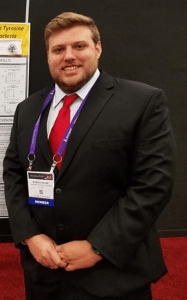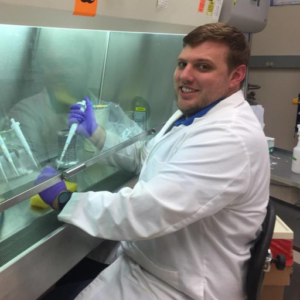Investigator Profile: Robert C. Sharp

Project: The SIRP:CD47 Signaling Pathway in Pancreatic b-Cell Survival
NIH NIDDK Emerging Leaders Recipient
►Where are you from originally, and where did you go to school?
I was born and raised in Gulf Breeze, a small town close to the beach near the top of the panhandle of Florida. I got my B.S. in Biotechnology, M.S. in Biomedical Sciences, and a Ph.D. in Biomedical Sciences, all from the University of Central Florida (UCF) in Orlando, FL.
►What is your current position?
I currently work as a Postdoctoral Associate in Dr. Todd Brusko’s laboratory at the University of Florida Diabetes Institute (UFDI).
►Why did you decide to become a researcher?
The inkling of the idea for me to become a researcher started at a young age (around the 8th grade). It started with my fascination with the world of microbes, where I loved looking at magnified bacteria, protozoa, and plant/animal cells. I wanted to know how the animals and humans function on a molecular level and how something so small, such as human cells, can be so complex. What sealed the deal about wanting to be a medical researcher, especially for Type 1 Diabetes (T1D), was that an old friend of mine started to demonstrate T1D complications at around 17 or 18 years old. After seeing the effect of T1D on that person and knowing how it affects other people at even younger ages, this event really got me on the path of becoming a T1D researcher. It took lots of time and I had to go on other paths in autoimmunity, including Crohn’s disease and rheumatoid arthritis research, in order to get to my goal in doing T1D research. In the end, I finally have the chance to not only have my research potentially help the people I know, but to also help everyone else who suffer from T1D complications.
►What is the “Big Picture” of what you study?
My research in examining the signal regulatory protein (SIRP) family of receptors and their binding partner the integrin associated protein (IAP; CD47) will give us more insight on how immunoregulation in T cells and NK cells are dysregulated in T1D development. With one of the SIRP family of receptors, SIRPG, having two significant T1D risk-associated single nucleotide polymorphisms (SNPs) tagged to SIRPG, my research will determine the functional consequences of these SNPs along with understanding the basic role of the SIRP/CD47 pathway signaling in human immune cells and islet beta cells. With the methodologies Dr. Brusko’s laboratory has developed and our understanding of SNP risk-allele consequences towards immunoregulation, my research can also translate into examining other immunoregulatory pathways involved in T1D and other autoimmune diseases. Overall, we expect our research in SIRP/CD47 signaling pathway between immune cell and islet beta cell to provide the foundation of the development of newer diagnosable biomarkers or potential treatments for T1D development.
►What is your favorite aspect of your research?
My favorite aspect of my research is knowing my innovative ideas and my research can lead to breakthrough treatments of T1D and other autoimmune diseases. With my fellow colleagues and our leaders at the UFDI, we have developed a strong team effort in determining how genetic risk results in the development of T1D. I am proud to be included in this work. Another aspect I enjoy with my research is getting to use cutting edge technology to examine my genes/proteins of interest. One of the most advance techniques we use that I love to do is use the CRISPR-Cas9 gene editing system we developed in our lab to knockout our gene of interest. Using this technology has helped me tremendously with understanding the basic functions of the SIRPG/CD47 pathway in T cells, NK cells, and pancreatic beta cells. This is just one aspect of many that our lab does that includes technologies such as single cell sequencing, the development of an islet-immune chips (iiChip), lentiviral TCR transduction, immunophenotyping via flow cytometry, and much more.
► What do you hope to achieve with your research?
What I hope to achieve with this research is to be able to shed light on a potentially new immunoregulation pathway that could be involved in T1D development. The purpose and function of SIRP/CD47 signaling pathways are unclear in not only T1D development, but autoimmunity in general. I want to explore this avenue and expand it more to ultimately make SIRP/CD47 signaling and expression as potential biomarkers for autoimmune diseases. Also, I would hope that discovering the modulation of this pathway could potentially lead towards newer targets for T1D treatment. In the future, I want to be able to connect the SIRP/CD47 signaling pathway to other immunoregulatory pathways that have been associated with T1D or other autoimmune diseases, such as the PTPN2, PTPN22, and the SH2B3 signaling pathways.
► What groups are you involved with?
Professional Groups: 1. Consortium on Human Islet Biomimetics (CHIB) 2. American Association of Immunologists (AAI) 3. Pathology Department Postdoc Club at the University of Florida 4. Review Editor for the journal Frontiers in Clinical Microbiology 5. Review Editor for the COVID-19 Taskforce for Frontiers Journal Personal Groups: 1. Orange Theory Fitness Group.
►When not in the lab what are your favorite hobbies/activities?
When not in lab, I am usually working out either running or weightlifting with my wife. I am also an avid video game player and collector, where I have a huge collection of older and newer video games (~100 -~150 video games). When I am not busy with writing my research manuscripts, I enjoy expressing my artistry as a painter and a fiction writer.
►Anything additional you would like to share with the group (comment: special honor/award, skill, hobby, etc.)
I was a college football player before going to UCF, where I played briefly at Birmingham Southern College in Birmingham, Alabama. I also use to be a bass guitar player, but haven’t had the time to get back into it again. My last award I won was in 2020, where I received a departmental award for an outstanding UF Experimental Pathology Innovative Grant (EPIG) project for my research in modeling of the SIRPG/CD47 signaling pathway in the pathogenesis of T1D.
|
|


